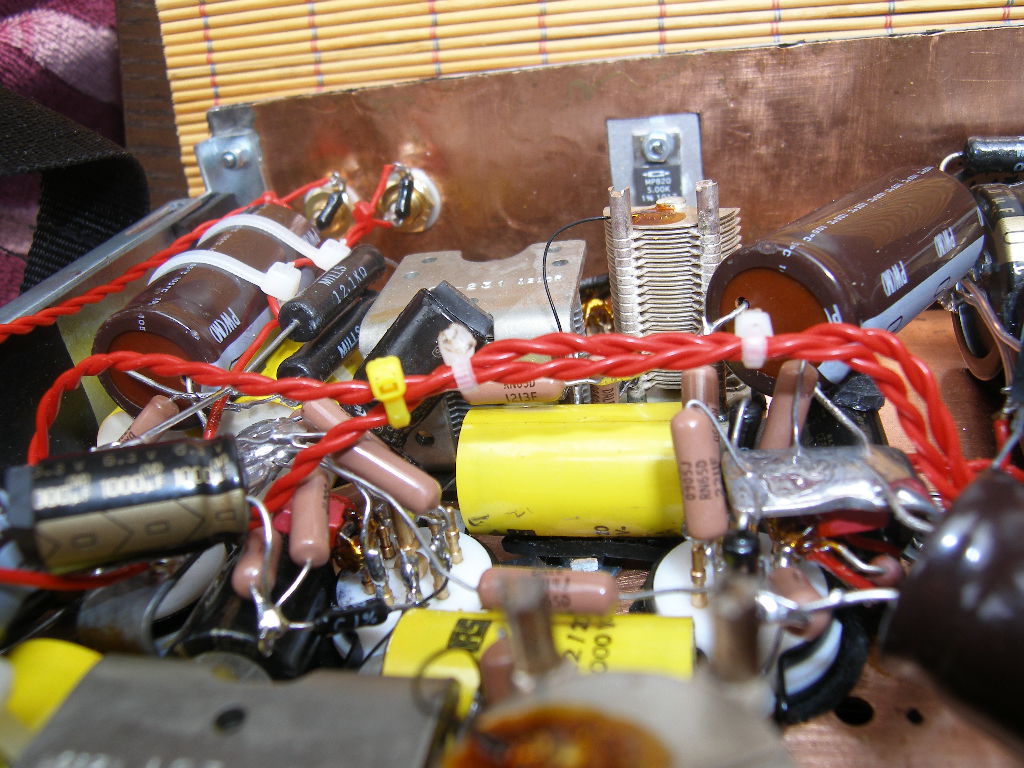|
|
N-set
Warsaw, Poland
Posts 642
Joined on 01-07-2006
|
Post #:
|
105
|
|
Post ID:
|
16893
|
|
Reply to:
|
16890
|
|
|
|
The assembly and the buzz
|




|
|
|
|
|
fiogf49gjkf0d  Romy the Cat wrote: Romy the Cat wrote: | | I do like the assembly. I o not fine it messy at all BTW. I would like to have inputs slightly closer to the grid of the first tube.. |
|
I'd prefer to have the ground terminals much closer to the ground plane and more of them (like in your layout, but not
using steel/copper contact, rather copper/copper like I did). The signal layout has been compromised by the
CCS heating elements, which, perhps not very wisely, I've decided to mount directly on the tube sockets. If doing it the 2nd time, I'd put the CCS somewhere close to the cap bank (on the right on the pic's). The input to the grid--I wanted to have quite some
space for the SUT's and eventual future experimentation with multiple inputs and ways to switch them
(thermocouple-grade, microvolt -rated Hg relais).
 Romy the Cat wrote: Romy the Cat wrote: | I would also run the heater wire further from the circuit and decent them from higher distance.
|
|
Yes, it was one of the fuck-ups--a bit too short heater wires. But they do not lie on the parts as the pics suggest,
they are a bit elevated:

 Romy the Cat wrote: Romy the Cat wrote: | | With all in place you shall have sun 3-5mV of notice from MC level. BTW, I do not see any MC level efforts, so I guess it will be juts MM phonostage, right? |
|
No! You've named that very well--"MC efforts". It has been an ongoing, half-a-year effort to get any output from
Tribute and I begin to loose hope honestly. Pieter is a nice-sounding guy, but he is either very very slow
or not interested and pushing the order to the end of his list. I wanted to experiment with HUGE custom nanocrystaline
cores, which I've sent him back in april. The cores turned out not too efficient induction-wise, but I insisted
to wind them anyway, hoping induction is not the only parameter here and promissed to buy his regular SUT's
if the experiment fails. So far no sensible output. If someone has any interesting option for SUT's I may be interested.
 Romy the Cat wrote: Romy the Cat wrote: | | Make sure that your input chokes “work” and that you bled enough current. Use good tubes and post your observations about Sound. BTW, you might want to make observations by replacing the air caps with mica caps (or whatever best caps you will be able to find). It is very easy to do and the results are very illustrative. Also, after you calibrated the air caps do not shake the unit as the air caps might move. It is difficult to adjust the air caps after they are in circuit… |
|
I'll scope the PSU soon to check the opreation. Caps, ok, I cantry that. Adjusting the caps--this battle is stillin front of me.
Actually my plan was to adjust them in the circuit, rather than desolder-adjust-resolder.
 Romy the Cat wrote: Romy the Cat wrote: | | PS: I did purge the image gallery. |
|
(whatever) god bless you!!!
 Paul S wrote: Paul S wrote: | No way to guess about
grounding, at least until you show the final traces. I simply must use
shielded inputs, and I bleed these "upstream" via a "dedicated" ground
(and certainly NOT the "house ground"...). Yes, I realize this is not
the desired "star" grounding. However, it was this or madness. Also,
some units require to cap any and all unused inputs, and some even the
unused outputs.
BTW, I would root out that ".5m" buzz like a terrier on speed... |
|
Paul, the output noise I've been having so far is not a buzz but a white noise,
which I attribute to shitty, noisy tubes (and eventually VR's, I'll put a screening cans around them).
I'll try to record and show the traces.
One channel (the one "down" on the picture, farthest from the output RCA's) do have
a very faint feeling of the 50Hz buzz. It's below my level of audibility, I more "feel it"
with my headphones max vol (or see on the scope) rather than hear.
It dissappears when I touch either the case, which suggest some grounding probelm...very strange...
If I lift the ground (break Cu ground plane connection to the case) the buzz becomes
very loud, but only in this one channel. The other is intact. I'll have to investigate that.
Both channels are wired in a similar way, the heaters are DC, well stabilized, etc.
Cheers,
Jarek
|
|
|